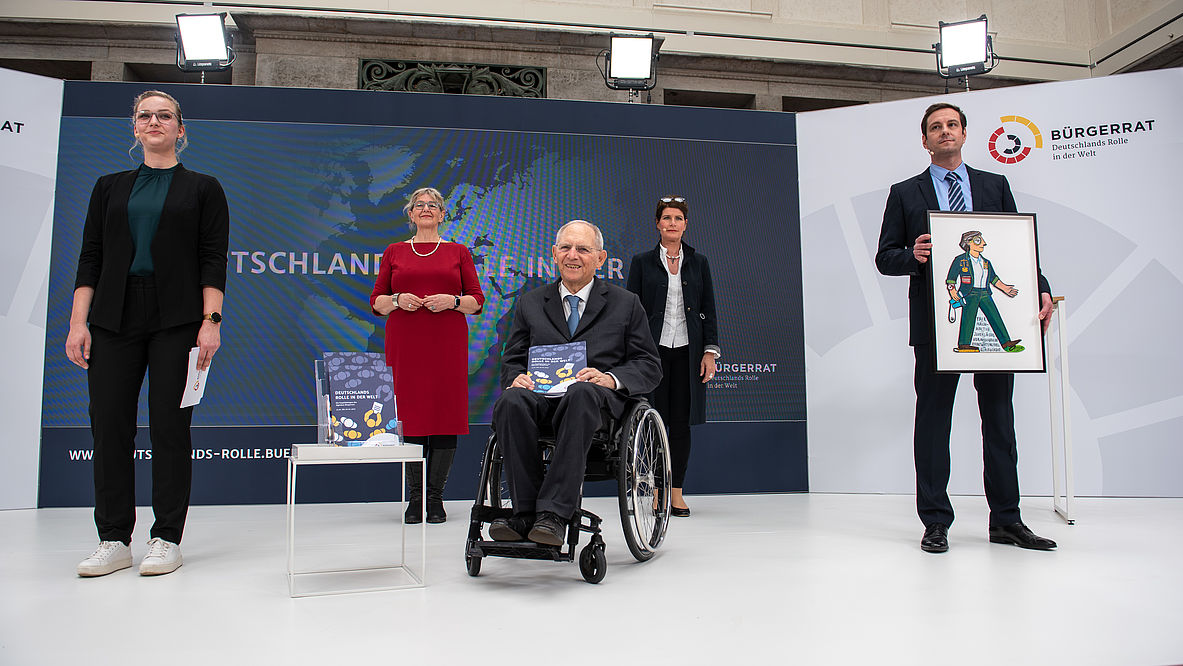Patron Wolfgang Schäuble accepts proposals from Citizens' Assembly on foreign policy

The Citizens' Assembly on "Germany's Role in the World" today (19 March) presented its proposals to the President of the German Bundestag, Dr. Wolfgang Schäuble, who was the patron of the process. On behalf of the 152 participants of the Citizens' Assembly who were drawn by lot, Tonja Buchholz and Michael Korth presented the 75-page report during a public handover ceremony at the Robert Bosch Stiftung in Berlin. In addition to some guiding principles on Germany's role in the world, the report also contains 32 specific recommendations on topics of peace and security, democracy and the rule of law, the EU, economy and trade and sustainability. These recommendations were voted on by the citizens in the last meeting of the Citizens' Assembly.
Bundestag Parliamentary Secretaries Michael Grosse-Brömer (CDU/CSU), Britta Haßelmann (Bündnis 90/Die Grünen), Jan Korte (Die Linke) and Bernd Baumann (AfD) as well as Members of Parliament Grigor Aggelidis (FDP) and Helge Lindh (SPD) were present for the ceremony via livestream. The citizens from all over Germany who participated in the Assembly were also present.
On the occasion of the handover, Bundestag President Schäuble said: "Democracy thrives on broad participation - and on responsible political decisions. The Citizens' Assembly has drawn up an assessment of our country's foreign and security policy. Their work was met with a high level of public interest. Now it is up to policymakers to address the recommendations on the table. I thank all those involved for their commitment and will do my utmost to ensure that the recommendations developed receive the attention they deserve in the parliamentary process."
"The strength of this report lies in the fact that it sketches a picture of the opinions that responsible and thoughtful citizens from very different walks of life, world views, generations and regions have developed. It is much closer to "the voice of the people" than what some politicians or political parties consider to be the public opinion or what quick opinion polls can suggest. It would be foolish for members of the Bundestag to let this capital go unused," said Marianne Birthler, chair of the Citizens' Assembly.
"The Citizens' Assembly has answered the Bundestag's question about Germany's role, and now the ball is in the politicians' court. The success of a Citizens' Assembly depends on how its results are handled," explained Claudine Nierth, board spokeswoman for Mehr Demokratie, which initiated the Citizens' Assembly together with the initiative Es geht LOS. "In addition, we now have to evaluate this experience with a first digital Citizens' Assembly. We will also use the scientific evaluation of the process to further shape this promising tool of citizen participation. An important goal of this Citizens' Assembly was also to make recommendations on how parliamentary work can be supported through Citizens' Assemblies in the future."
Livestream of the event (from 11h30 CET, 19 March, and will remain available afterwards) https://www.youtube.com/user/mehr0demokratie0de
Photos, for free editorial use, source: Mehr Demokratie. Photographer: Robert Boden (from approx. 17h00 CET, 19 March): https://www.flickr.com/photos/mehr-demokratie/albums/72157718703979488
For more information: Caroline Vernaillen, Press Officer, vernaillen(at)democracy-international(dot)org, +49 178-9459007.
+++ Background:
The Citizens' Assembly "Germany's Role in the World" was the second nationwide sortition-based Citizens' Assembly in Germany. It is a direct follow-up to the Citizens' Assembly on Democracy of 2019, the results of which were brought to the attention of the parliamentary groups by Bundestag President Wolfgang Schäuble. The topic of "Germany's Role in the World" was chosen at the request of the Bundestag's Council of Elders, and Mehr Demokratie agreed to organize and provide funding for this second Citizens' Assembly.
During ten online events from January 13 to February 20, about 160 people drawn at random from the population registers drafted recommendations for how Germany should act on the global political stage in the future. To tackle this vast topic, some key issues were identified in advance with the involvement of politicians, scientific advisors, civil society organizations and randomly-selected citizens, and a representative survey was carried out. To provide the Citizens' Assembly with background information on the different themes, experts from with different views were invited to present. The Citizens' Assembly started out with 169 participants, but some participants had to leave the process for health or technical reasons, so that the Citizens' Assembly closed with 152 randomly drawn participants. In the last session, the joint recommendations were voted on.
The Citizens' Assembly was independently conducted and moderated by the institutes ifok, IPG and nexus. The project was supported by the Robert Bosch Stiftung GmbH, Schöpflin Foundation, Stiftung Mercator, ZEIT-Stiftung, GLS Treuhand, Open Society Foundations, Volkswagen Foundation (evaluation) and other private donors.